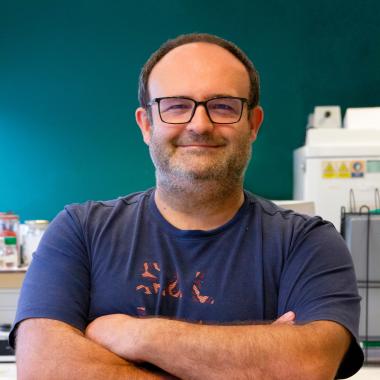
Jorge Carrillo Molina
Dr. Carrillo obtained his degree in Biological Sciences from the University of Córdoba (Spain) in 2000. In 2001 he joined Dr. Verdaguer’s group at the Immunobiology Laboratory for Research and Diagnostic Applications (LIRAD-BST) in Badalona, where he undertook doctoral training focused on the immunobiology of type 1 diabetes (T1D), specifically, the study of the antigen specificity of islet-infiltrating B-cells in non-obese diabetic mice, a reference mouse model for T1D studies.
In 2009 he joined Dr. Julià Blanco’s group at IrsiCaixa, under the auspices of the Sara Borrell post-doctoral programme, in order to launch a new research line addressing B-cells and humoral response in the course of HIV-1 infection. His work here covered three different but interlinked topics: alterations in the biology of B-cells caused by HIV-1 and other diseases; new methodologies to identify and produce broadly neutralizing antibodies and, finally, HIV-1-based immunogens capable of generating broadly neutralizing humoral responses. In 2013 he joined the Icahn School of Medicine at Mount Sinai (New York, USA), where he worked with Dr. Andrea Cerutti, an internationally recognized researcher in the field of B-cells and mucosal immunology. In January 2014 he joined Dr. Denise Naniche’s group at the Barcelona Centre for International Health Research (CRESIB), where he worked on characterizing the humoral response and identifying inflammatory biomarkers that enable a better definition of early-stage HIV-1 infection. In November 2015, Dr. Carrillo was appointed associate researcher in IrsiCaixa, and in May 2020 he was designated as senior principal investigator creating the Immunology Group (IgG) at IrsiCaixa. In addition, he is working as Chief Scientific Officer (CSO) in AlbaJuna Therapeutic, an IrsiCaixa’s spin-off focused on the development of broadly neutralizing proteins against HIV-1 to be used in cure strategies.
Production and characterization of novel Anti-HIV Fc-fusion proteins in plant-based systems: Nicotiana benthamiana & tobacco BY-2 cell suspension.
Proteomics of circulating extracellular vesicles reveals diverse clinical presentations of COVID-19 but fails to identify viral peptides.
NSGS mice humanized with cord blood mononuclear cells show sustained and functional myeloid-lymphoid representation with limited graft-versus-host disease.
Novel Spike-stabilized trimers with improved production protect K18-hACE2 mice and golden Syrian hamsters from the highly pathogenic SARS-CoV-2 Beta variant.
Production and Immunogenicity of FeLV Gag-Based VLPs Exposing a Stabilized FeLV Envelope Glycoprotein.